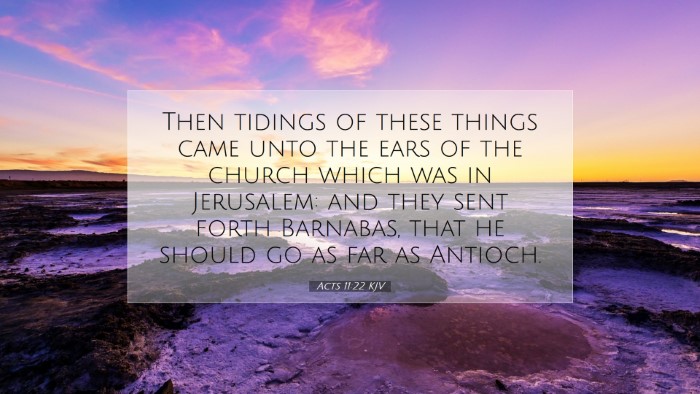Commentary on Acts 11:22
Acts 11:22 states: "Then tidings of these things came unto the ears of the church which was in Jerusalem; and they sent forth Barnabas, that he should go as far as Antioch."
Introduction
This verse marks a significant point in the early church's history, revealing the church's response to the spreading of the Gospel beyond Jewish communities. The delegation of Barnabas to Antioch emphasizes the unity and mission of the church, as well as the emerging influence of Gentile believers.
Historical Context
To fully understand Acts 11:22, it is important to grasp the historical context within which the early church functioned. The church in Jerusalem was the heart of early Christianity, and its actions were pivotal in shaping the character and mission of the church universal.
Jerusalem Church's Response
News from Antioch, where a considerable number of Gentiles began to convert to Christianity, reached the Jerusalem church, igniting a sense of duty among its leaders. The decision to send Barnabas exemplifies the church's proactive approach to support and guide new believers, demonstrating the early commitment to church growth and doctrinal integrity.
Commentary Excerpts
Matthew Henry's Commentary
Matthew Henry emphasizes the importance of communication within the church. He writes, "The tidings of the grace of God working among the Gentiles reached the church at Jerusalem... This exemplifies the communal nature of early Christianity, where news travels swiftly, and the leaders are concerned for the believers' growth." He notes that the church's willing response indicates the divine orchestration of events and the Holy Spirit's guidance in expanding the reach of the Gospel.
Albert Barnes' Notes
Albert Barnes expands on the significance of Barnabas being sent. He observes, "Barnabas was a good man, full of the Holy Ghost and of faith; his character was suited to the work; he possessed the necessary qualities to nurture the new converts in Antioch." Barnes highlights Barnabas’s role as a pastoral figure, showcasing the need for mature leadership in guiding young churches, especially amidst a diverse and possibly challenging cultural backdrop.
Adam Clarke's Commentary
Adam Clarke notes that the passage illustrates the leadership structure within the early church. "The apostles and elders in Jerusalem maintained authority and oversight over the churches, ensuring that the spreading of the Gospel remained grounded in sound teaching." Clarke also points out the strategic importance of sending Barnabas, indicating that the decision was based on his reputation and spiritual qualifications, which would inspire confidence among the Gentile believers.
Theological Implications
Acts 11:22 opens up several critical theological reflections, particularly concerning apostolic authority, the mission of the church, and the role of community in spiritual formation.
Apostolic Authority
The response from the Jerusalem church demonstrates a model of leadership that is both accountable and responsive, reflecting the principle that church leaders are called to shepherd their flocks actively and with discernment.
The Mission of the Church
The act of sending Barnabas highlights the church's sincere commitment to spreading the Gospel. This inclination towards mission underscores a growth mindset that the church adopted, valuing outreach to diverse communities, which was a departure from the exclusively Jewish focus of earlier ministry.
Community and Spiritual Growth
This scripture illustrates the essential role community plays in nurturing faith. The church in Jerusalem, aware of its wider family in Antioch, took actionable steps to ensure the spiritual well-being of new believers, promoting an ethos of care and support.
Applications for Today
The message conveyed in Acts 11:22 remains pertinent for contemporary churches:
- Leadership and Guidance: The necessity of wise and spiritually mature leaders in guiding new believers cannot be overstated. Pastoral care continues to be one of the church's prime responsibilities.
- Unity in Diversity: The early church embraced the Gentiles, which speaks to the modern church’s need to welcome diversity and promote unity among different cultural backgrounds.
- Active Mission Work: Just as the church in Jerusalem took initiative in mission work, the contemporary church is called to engage actively with its community and beyond, sharing the Gospel and addressing the needs of those they encounter.
Conclusion
Acts 11:22 serves as a powerful reminder of the early church's responsiveness to God's work and its commitment to nurturing the faith of new believers. The examples set by leaders like Barnabas encourage today’s church to remain vigilant, compassionate, and proactive in its mission.


